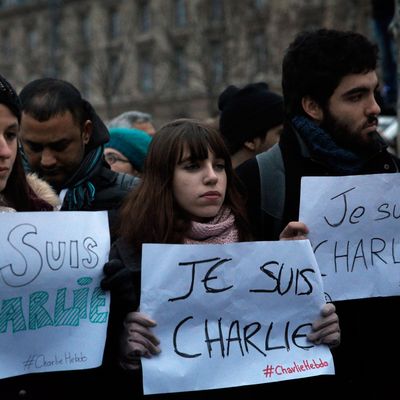
In the face of violent threats against blasphemy, the defense of the right to blasphemy is impossible without blasphemy itself. I neglected to make clear the first part of that formulation when I made that case in the wake of the Charlie Hebdo massacre, in part because I wrote in haste, and in part because I considered it too obvious to require mentioning. This condition turns out to be the source of significant confusion, or in some cases obstuseness, that is causing a number of critics to miss the most important element of this episode.
Critics mostly on the left (Glenn Greenwald, Maria Bustillos, Joe Sacco) but also on the right (David Brooks) have made variations of the argument that Charlie Hebdo is obnoxious and vulgar, or possibly bigoted, and thus that while murdering everybody there may be wrong, etc. etc., Charlie Hebdo’s work in and of itself does not deserve defense.
I am not a Charlie Hebdo reader, and am a non-Francophone with no plans to become one, but this misses the point completely. Let us stipulate for the sake of argument that Charlie Hebdo is crude and even racist. Freedom of expression is not a strong defense of crude, racist, or otherwise stupid expression. Indeed, one of the most common and least edifying defenses made by people who have proffered offensive opinions is that they have the right to free speech. The right of expression is not the issue when the objection centers on the content.
In this case, the content of Charlie Hebdo’s work is not the issue. The issue is the right of publication. Given the fact that violent extremists threaten to kill any journalist who violates their interpretation of Islam, establishing the freedom (I argue) requires committing the blasphemy. To argue, as some have, that the threat is wrong, but that journalists should avoid blasphemy out of prudence allows the extremists to set the rules.
Ross Douthat, writing a bit more patiently than me, laid this out more explicitly. Douthat was very clear about his argument: Vulgar expression that would otherwise be unworthy of defense becomes worthy if it is made in defiance of violent threats. Bustillos assails Douthat by pointing out various times when he has criticized vulgarity, neglecting even to consider the distinction that forms the entire core of his argument.
Greenwald and Sacco make the same analytic error, and throw in references to various Western misdeeds against Muslims in Iraq and elsewhere. This is the sort of moral distraction it is common to find when a person believes the wrong kinds of victims are being celebrated or the wrong kinds of perpetrators decried. (Greenwald: “the west has spent years bombing, invading and occupying Muslim countries and killing, torturing and lawlessly imprisoning innocent Muslims, and anti-Muslim speech has been a vital driver in sustaining support for those policies.”) It’s the same impulse driving conservatives to turn cases of police brutality into meditations on black-on-black crime. That is that; this is this.
“No mainstream western cartoonist would dare put their name on an anti-Jewish cartoon, even if done for satire purposes, because doing so would instantly and permanently destroy their career, at least … ” writes Greenwald, “Why aren’t Douthat, Chait, Yglesias and their like-minded free speech crusaders calling for publication of anti-Semitic material in solidarity, or as a means of standing up to this repression?” Well, the answer is very simple: because nobody is murdering artists who publish anti-Semitic cartoons.






























